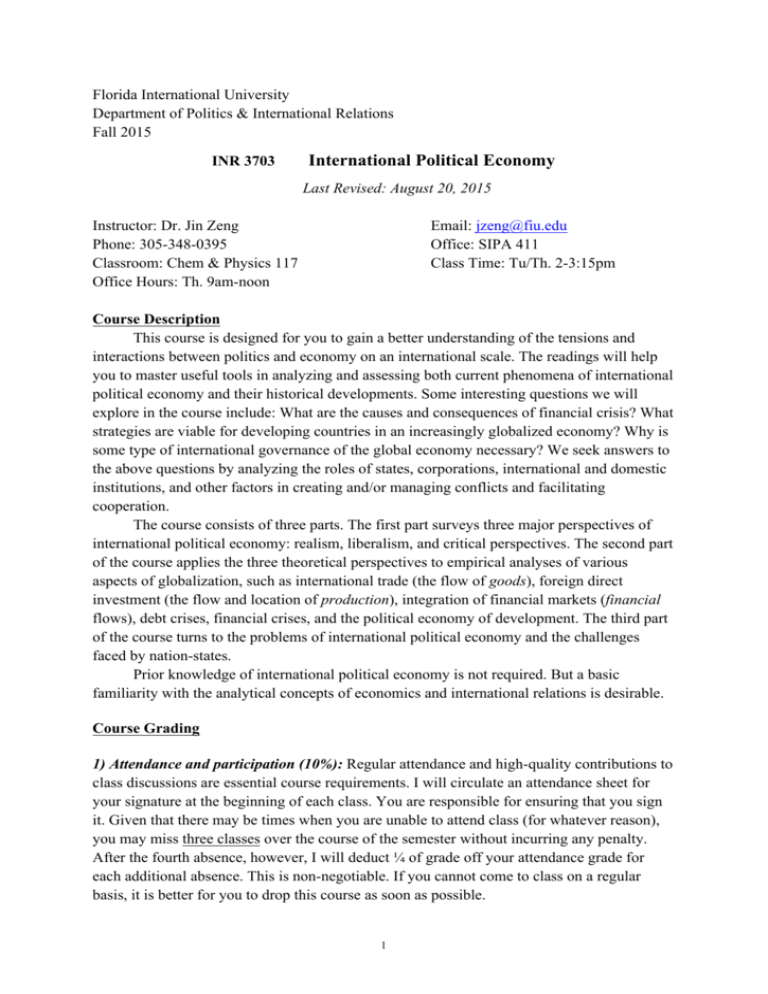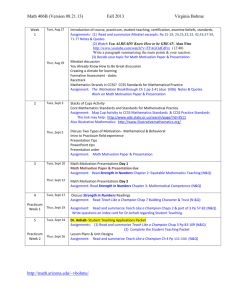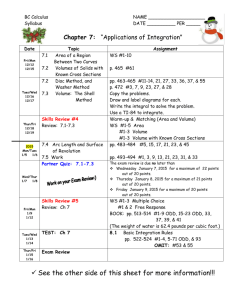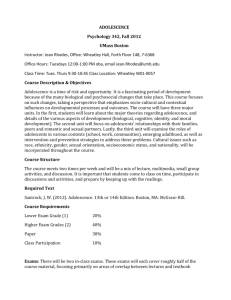INR 3703 International Political Economy
advertisement

Florida International University Department of Politics & International Relations Fall 2015 INR 3703 International Political Economy Last Revised: August 20, 2015 Instructor: Dr. Jin Zeng Phone: 305-348-0395 Classroom: Chem & Physics 117 Office Hours: Th. 9am-noon Email: jzeng@fiu.edu Office: SIPA 411 Class Time: Tu/Th. 2-3:15pm Course Description This course is designed for you to gain a better understanding of the tensions and interactions between politics and economy on an international scale. The readings will help you to master useful tools in analyzing and assessing both current phenomena of international political economy and their historical developments. Some interesting questions we will explore in the course include: What are the causes and consequences of financial crisis? What strategies are viable for developing countries in an increasingly globalized economy? Why is some type of international governance of the global economy necessary? We seek answers to the above questions by analyzing the roles of states, corporations, international and domestic institutions, and other factors in creating and/or managing conflicts and facilitating cooperation. The course consists of three parts. The first part surveys three major perspectives of international political economy: realism, liberalism, and critical perspectives. The second part of the course applies the three theoretical perspectives to empirical analyses of various aspects of globalization, such as international trade (the flow of goods), foreign direct investment (the flow and location of production), integration of financial markets (financial flows), debt crises, financial crises, and the political economy of development. The third part of the course turns to the problems of international political economy and the challenges faced by nation-states. Prior knowledge of international political economy is not required. But a basic familiarity with the analytical concepts of economics and international relations is desirable. Course Grading 1) Attendance and participation (10%): Regular attendance and high-quality contributions to class discussions are essential course requirements. I will circulate an attendance sheet for your signature at the beginning of each class. You are responsible for ensuring that you sign it. Given that there may be times when you are unable to attend class (for whatever reason), you may miss three classes over the course of the semester without incurring any penalty. After the fourth absence, however, I will deduct ¼ of grade off your attendance grade for each additional absence. This is non-negotiable. If you cannot come to class on a regular basis, it is better for you to drop this course as soon as possible. 1 2) In-class quizzes (20%): I will hand out in-class quizzes at the beginning of the class on selected dates. Each quiz consists of 5 multiple-choice questions based on the assigned readings of that week. You should complete assigned readings before coming to class. If you are late for the class, you will not be able to take part in the quiz. There is no make-up quiz in the course. 3) News reporting (10%): Starting from the second week of the semester, students will take turns to orally report to the whole class one piece of news related to international political economy. You should not simply read the news to the class. Instead, you should take this opportunity to hone your presentation skills. I highly encourage you to use slides to highlight the data or figures in the news. The news can be a day to a week old. Each student’s news reporting should be limited to 1-2 minutes. Please stay informed of current international political, economic, and social events relevant to this course by reading newspapers or magazines, such as the business section of The New York Times, BBC News, The Economist (http://www.economist.com/), The Wall Street Journal (http://www.wsj.com/), and Financial Times (http://www.ft.com/home/us). We will briefly discuss news of global political economy during class meetings. If you miss your turn to do the news reporting, you will not be given another chance without legitimate reasons. 4) Exams (60%): There will be three in-class exams (two midterms and a final). The exams will draw on materials from lectures, class discussions, and reading assignments. Each exam consists of brief identifications and short essay questions. The first two exams are non-cumulative, meaning that they cover materials not previously tested. The final exam is cumulative, but it places more emphasis on the last part of the course. Each of the exams accounts for 20% of the final grade. The grading scale is displayed in the following table. Score Grade Score Grade 93 – 100 A 73 – 76 C 90 – 92 A70 – 72 C87 – 89 B+ 67 – 69 D+ 83 – 86 B 63 – 66 D 80 – 82 B60 – 62 D77 – 79 C+ 0 – 59 F Course Policies 1) This course uses Blackboard Learn to facilitate our communication and learning experience. Course-related materials, such as syllabus, reading materials (except the two required books), slides, and assignments, will be available at Blackboard Learn. You can access Blackboard Learn by visiting http://online.fiu.edu/login/ecampus, and login with your FIU account information. Make sure you check Blackboard Learn and your FIU email account on a daily basis. 2) No make-up exams will be given. If you miss an exam, the weight of the exam will be 2 3) 4) 5) added to the following one with a penalty of -5 points. For example, if you miss the first exam and you get 90 in the second exam, your “downgraded” score of the second exam will be 85, which will account for 50% of your final grade. However, if you miss two exams or if you miss the final exam, you automatically fail the course. Classroom Etiquette: Please turn off cell phones prior to the beginning of class. Appointment: I welcome students to contact me by email or visit me during office hours. You can also email me to schedule an appointment. Academic Integrity: Please note that plagiarism and other forms of cheating will result in a failing grade of the course and/or expulsion from the university itself. See the university's policy on academic misconduct at http://www.fiu.edu/~oabp/misconductweb/1acmisconductproc.htm. Required Books Cohn. Theodore H. 2011. Global Political Economy: Theory and Practice. 6th edition. New York: Longman. ISBN-13: 978-0205-075836. (Note: You can buy the 5th edition, as most of the chapters in the two editions are identical.) Balaam, David N. and Bradford Dillman. 2013. Introduction to International Political Economy. 6th edition. Upper Saddle River, NJ: Prentice Hall. ISBN-10: 0133402398. (Note: I will provide a personal copy of Balaam and Dillman’s book in the reserve of the library.) 1. Aug. 25, Tues. Introduction: What is International Political Economy? Cohn. Ch1, pp. 2-17. 2. Aug. 27, Thur. Managing the Global Economy Since World War II Cohn. Ch2, pp. 18-51. PART I. THEORETICAL PERSPECTIVES 3. Sept. 1, Tues. The Realist Perspective Cohn. Ch 3, pp. 56-76. 4. Sept. 3, Thur. NO CLASS (professor away at the APSA Conference)! 5. Sept. 8, Tues. The Liberal Perspective Cohn. Ch 4, pp. 77-102. 6. Sept. 10, Thur. The Critical Perspective Cohn. Ch 5, pp. 103-130. PART II. CORE ISSUE AREAS 7. Sept. 15, Tues. The International Monetary System 3 Cohn. Ch 6, pp. 132-167. 8. Sept. 17, Thur. Foreign Debt and Financial Crises Cohn. Ch 11, pp. 339-380. 9. Sept. 22, Tues. The Asian Financial Crisis Wade, Robert. 2000. “Wheels within Wheels: Rethinking the Asian Crisis and the Asian Model.” Annual Review of Political Science 3: 85-115. 10. Sept. 24, Thur. In-Class Exam 1 11. Sept. 29 Tues. The 2008 Financial Crisis Wade, Robert. “The First-World Debt Crisis of 2007–2010 in Global Perspective,” Challenge 51(4) (July/Aug 2008), pp. 23-54. -Watch and discuss PBS Frontline: Inside the Meltdown, available at http://www.pbs.org/wgbh/pages/frontline/meltdown/ (57 minutes) -Global Financial Crisis Explained http://www.youtube.com/watch?v=Q-zp5Mb7FV0&feature=related (11 minutes) -RSA Animate: Crises of Capitalism http://www.youtube.com/watch?v=qOP2V_np2c0&feature=player_detailpage (11 minutes) -Global Financial Meltdown: https://www.youtube.com/watch?v=l4XfNiqwQDo (2hs 50 mins.) 12. Oct. 1, Thur. Austerity: The History of A Dangerous Idea Blyth, Mark. 2013. Austerity: The History of A Dangerous Idea. Oxford University Press. Ch 6 pp. 178-226. Watch Dr. Mark Blyth’s presentation on Austerity: The History of A Dangerous Idea http://www.youtube.com/watch?v=JQuHSQXxsjM Or a short version of his arguments: http://www.youtube.com/watch?v=2v8m-J8sgik&NR=1&feature=fvwp 13. Oct. 6, Tues. Global Trade Relations Cohn. Ch 7, pp. 168-208. 14. Oct. 8, Thur. Regionalism and the Global Trade Regime Cohn. Ch 8, pp. 209-248. 15. Oct. 13, Tues. Multinational Corporations and Global Production Cohn. Ch 9, pp. 249-293. 16. Oct. 15, Thur. International Development Cohn. Ch 10, pp. 294-338. 4 17. Oct. 20, Tues. What Strategies are Viable for Developing Countries Today? Wade, Robert H.. 2003. "What Strategies are Viable for Developing Countries Today? The World Trade Organization and the Shrinking of 'Development Space'," Review of International Political Economy 10, 4 (November): 621-644. 18. Oct. 22, Thur. Aid to Developing Countries Horta, Korinna. 2006. The World Bank’s Decade for Africa: A New Dawn for Development Aid? Yale Journal of International Affairs (Winter/Spring). Available at http://www.yale.edu/yjia/articles/Vol_1_Iss_2_Spring2006/horta217.pdf 19. Oct. 27, Tues. The Rising Powers Balaam and Dillman, Ch 13. 20. Oct. 29, Thur. In-Class Exam 2 PART III: TRANSNATIONAL PROBLEMS 21. Nov. 3, Tues. The Illicit Global Economy Balaam and Dillman, Ch 15. 22. Nov. 5, Thur. Migration and Tourism Balaam and Dillman, Ch 16. 23. Nov. 10, Tues. Food and Hunger Balaam and Dillman, Ch 18. 24. Nov. 12, Thur. Oil and Energy Balaam and Dillman, Ch 19. 25. Nov. 17, Tues. The Environment Balaam and Dillman, Ch 20. 26. Nov. 19, Thur. Current Trends in the Global Political Economy Cohn. Ch 12, pp. 382-408. 27. Nov. 24, Tues. Watch a documentary: Life and Debt (48 mins) 28. Nov. 26, Thur. Thanksgiving Holiday (University Closed) 29. Dec. 1, Tues. Review Class 30. Dec. 3, Thur. Final Exam 5






